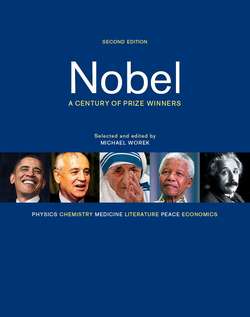Читать книгу Nobel - Michael Worek - Страница 45
На сайте Литреса книга снята с продажи.
ОглавлениеInternational Committee of the Red Cross
1917, 1944, 1963 Peace
The only Nobel Peace Prize to be attributed during World War I, for the help given to prisoners of war, by serving as an intermediary between them and the countries that captured them and for sending delegates to inspect the camps.
The Red Cross began when Henri Dunant, a Swiss citizen, noted that there existed no organized medical services to help the wounded during the bloody Battle of Solferino. In 1862 his Memory of Solferino was published and just one year later Dunant managed to attract enough support to establish the International Committee for Aid to the Wounded in Geneva.
In 1864, with the help of the Swiss government, a diplomatic conference was held. Representatives signed a convention with legally binding articles declaring that the medical corps, its assistants and the wounded themselves could not be considered as the enemy on the battlefield. So that they could be identified, an emblem was created that could be universally recognized as a sign of neutrality: a red cross on a white background.
The International Committee’s actions in times of war and peace have been recognized three times with a Nobel Peace Prize, more than any other organization. In 1917 and 1944 the award was given due to the work done during World War I and World War II. On the last occasion, in 1963, the prize was shared with the League of Red Cross Societies, now known as the International Federation of Red Cross and Red Crescent Societies (IFRC), which was founded in 1919.
The ICRC faced its first dramatic challenge during World War I. Immediately after the start of the conflict it established its Prisoners-of-War Agency, which was mostly staffed by international volunteers. By the end of the war the intervention of the agency was credited with the exchange of more than 200,000 prisoners between the warring parties, and by 1923 it had established a record system of more than 7 million prisoners or missing persons. This system aided in the identification of some 2 million prisoners of war and allowed communication to be established with their families. The International Committee of the Red Cross also distributed 20 million letters and messages, 1.9 million parcels and approximately 18 million Swiss francs in donations.
During World War II the ICRC carried out similar activities, although on a broader scale. The Central Information Agency on Prisoners of War contained information on 45 million prisoners and missing persons, delivered 120 million messages and organized relief efforts for civilian populations. After the world wars the ICRC continued to revise and expand its conventions, and in 1990 the United Nations General Assembly granted it observer status at its sessions.
The League of Red Cross Societies also received half of the 1963 prize.
